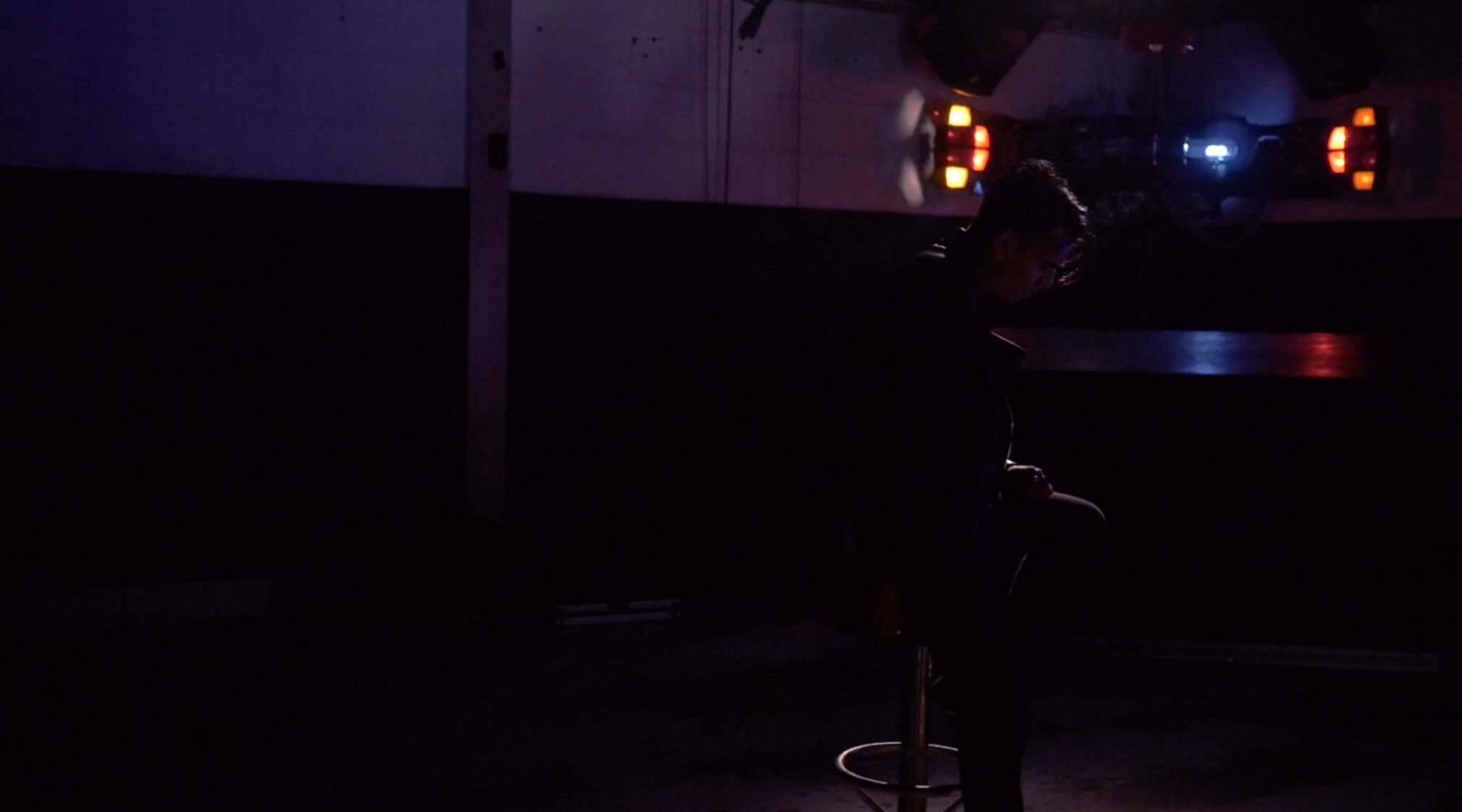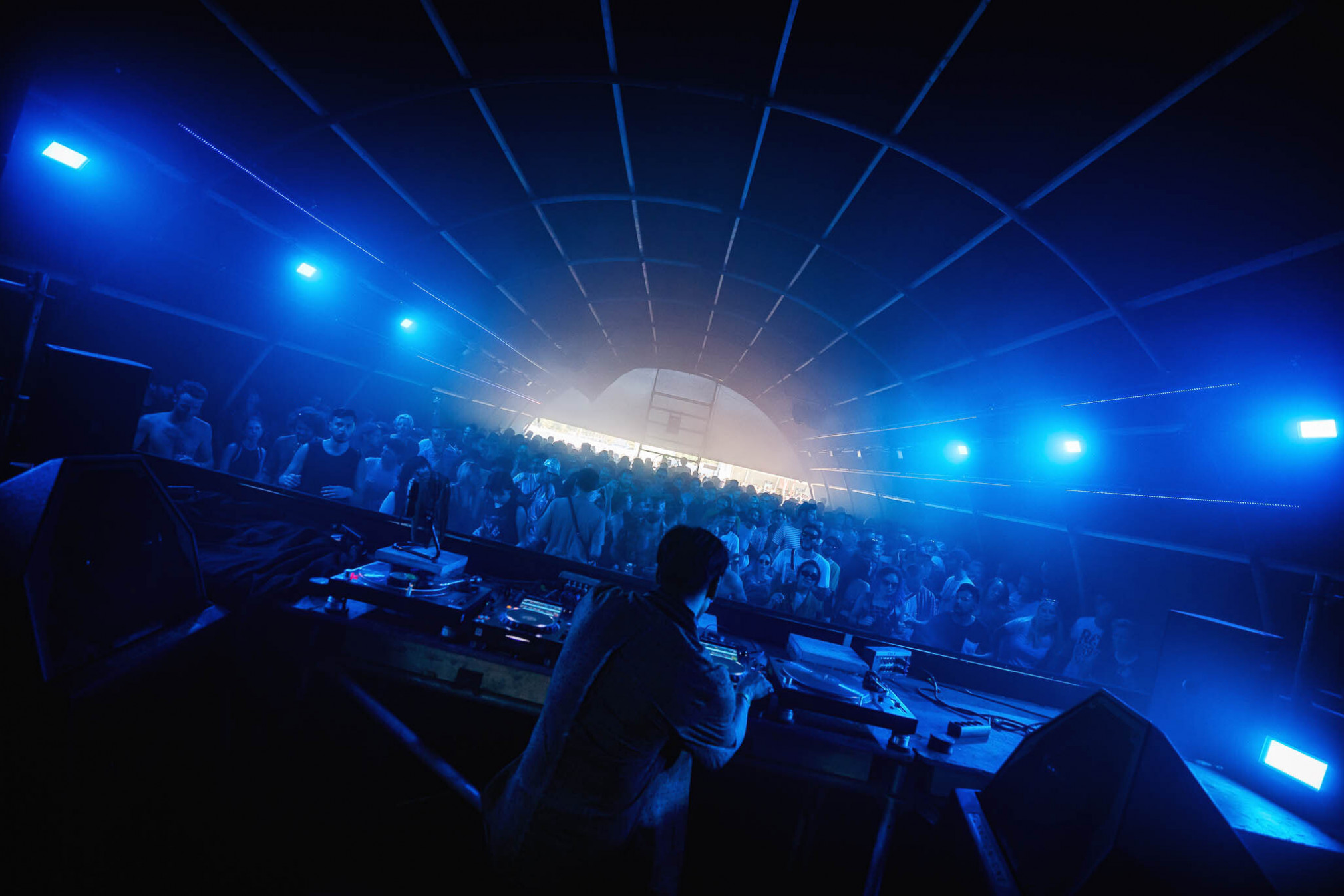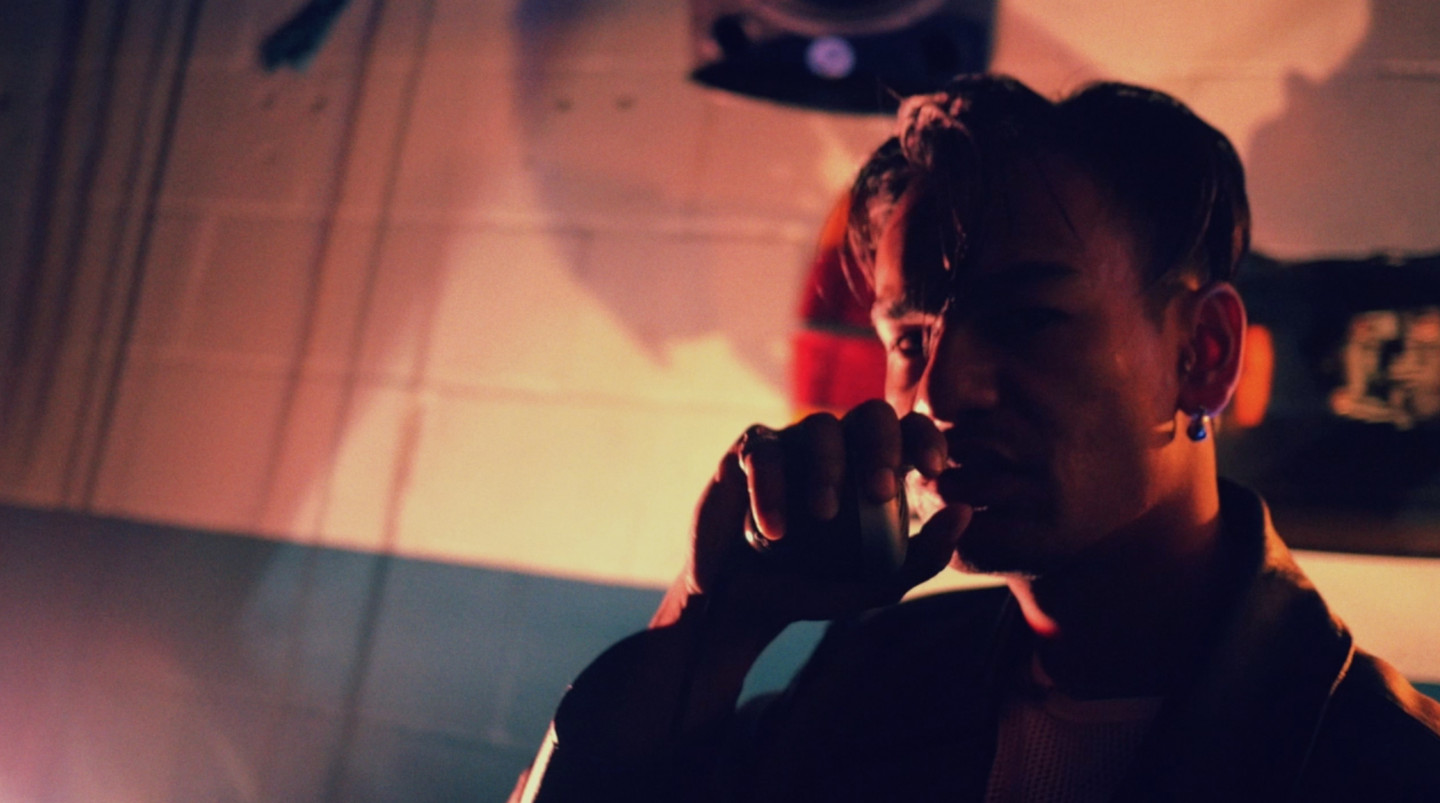If you have encountered Parrish Smith in the club, even the faintest memory of it can still make your heart race. Speed, sex, steel, sweat, suicide… they’re all commonly used to describe the artist’s universe. Consequently, it might come as a surprise that our next collaboration with the DJ and producer, unveiled during Dekmantel Connects, is of an ambient nature.
Words by Leendert Sonnevelt
Get to know him better, however, and you’ll understand that Parrish Smith is an explorer at heart – a heart that can bleed into any genre, sound, feeling or situation. Averse to being boxed in, the key to Parrish Smith is self-searching and self-expression. And whether the medium is all-analogue industrial, a soundtrack guided by spoken word, or full-throttle techno with a dose of Sepultura, his message is one of full devotion to music’s innermost realms.
I recall an early morning in the basement of De School where my friend asked ‘Wow, what are the punk vocals on this track?’ – then to find out you had a mic in your hand. When did you first get into this space where punk and electronic music merge? And how has this idea developed over the years?
Good question. Using vocals this way has been done before by acts like Alec Empire, for example, but maybe it’s unknown to the current generation. When I started DJing, it all started with playing vinyl and me being busy constantly selecting and correcting. Then I switched to playing digital, which is not as difficult, so you have more time on your hands to do something else. That’s when I found out how I could implement my core feelings in a club setting. I started experimenting with taking the mic with me, touching these direct and primal senses and getting rid of certain fears of myself through punk vocals, either rhythmic or very direct screams. It’s a very personal thing that resonated with people, so I started using it more and more.
Are your live vocals prepared, instinctive, or both?
I write a lot. Actually, I’ve been writing more and more, and it’s something you have to get into. At times, short poems that you can use on a beat. At other times, the things on top of my mind. It doesn’t always make sense, but it makes sense in the moment.
So, these vocals are flashes of what you’ve written before?
Yes. But they can also be something I recently experienced or something I saw floating around somewhere. I mix this with the poems I write at home or in the studio. It’s a bit of both; being prepared and letting the rest be adventure or intuition.
Would you call it improvisation?
‘Improv’ maybe implies that you’re looking for something outside of your spectrum. ‘Intuition’ comes from within – it’s a subtle difference. You need to create a space for yourself where you can apply both.

You’ve been described by music journalists as ‘disregarding genre’. I’d like to turn this around and say you regard all kinds of genres. When/where/how did your musical curiosity begin?
I think that curiosity began with me as an introverted kid who didn’t say a lot but thought a lot about the world around him. I think it’s seeker behaviour, and a long journey of growing up: from hearing soul, rock, reggae, Caribbean music and my mother’s traditional Indian music at home, to my sisters listening to R&B, and finding the UK scene through garage, jungle, etc. Most of it came organically through my family.
When you become a teenager you get into teenager music – in my case that was early '80s industrial, noise and punk, which resonated with my feelings at the time. It can be very difficult to find yourself in music, but as someone who didn’t really follow trends or groups at a young age, it was easier to dive into particular areas. When you’re a teenager you sometimes don’t know how you feel, you can be attracted to darker feelings – and this music really related to that very directly. Almost like a researcher of music, I slowly found my path.
When you found punk and industrial, as this solitary seeker, did it come with a certain scene or subculture?
It came with one of my best friends: Derozan. When we were 19 or 20, we dove into the world of vinyl together and browsed markets for second-hand music. I think the first music we got into was '80s punk, industrial and heavy electronics, for instance from L.I.E.S. records. From there, we discovered this underground scene in electronics: artists like Rabih Beaini, but also Traxx, a DJ who mixes wave, disco, house… everything! That gave me this sense of: wow, anything is possible. You can interconnect all these different things or genres, but first you have to know what you’re playing.
Does that ask for a lot of research?
For me, yes, but I’m not sure how it is for others. I need to feel like I can give back by what I know. I’m a researcher at heart and for me it’s natural to dissect the genres I’m into. But the question is: when do you stop and just use the knowledge you have? I think the path to discovery is too exciting.
Is there anything you’d never incorporate in a set?
Hmm, I’ve never thought of it that way. Good question, but there’s nothing I should rule out. I can be surprised by anything. The best thing about playing music for people in clubs, is what I’ve said before: ‘no elitism, no prejudices, no 4/4, no genre’. I’m still able to live by that, and that’s ok.
I was recently talking to Lena Willikens and she described beautifully how different elements in different genres can connect in one DJ set, no matter their musical background. For your own sets, what are those connecting points?
Well, the way Lena plays is very subtle; the elements are in key and the melodies shift smoothly. That kind of DJ is looking for very subtle things, and then surprises you when they break that feeling. I think that, similarly, I search for subtle elements, but in much harsher music. I mostly look at groove (going faster with the BPM), feeling, rhythm and intensities – and can use two or three tracks to completely change the entire mood or setting.
In terms of connecting points, the most important thing is timing; where another DJ uses two minutes of a track to fade in, I’ll use two seconds. This I learned mostly from vinyl and hip-hop mixing; cutting in, fading really fast, and playing with those moments. There’s also a downside to how I play; every time I focus on this fast cutting and mixing a lot of music, it’s hard to bring in – or balance out with – a slow fade. To be honest, this is still always a learning point, but if you’re a good DJ I think you can do both.
You’ve described before how the crowd during your Reaktor set would come and go at certain key moments. Also considering Volition Immanent, your project with Mark van de Maat, I’m curious: to what extent do you consider reception? You are making music that’s mostly played in clubs, after all.
I’ve always focused on making music for myself without intentions for the club sphere, so it surprised me that people played my music at the club. I can challenge myself by distancing myself from my productions, and going on an adventurous new path with my DJ sets. While playing, I observe the crowd a lot. I think about the people who come by and go, and the people who really come for my set. There are some key points in my DJ set where people can think: ‘That’s Parrish Smith.’
In-between those moments I play with the people who know me and those who don’t, and sometimes in the moment I think: ‘If they really want to know me, I gotta do something weird’. They might leave but that’s ok, because I’ll switch back to something else. I want to see how people react and I can give them something that’s authentic, so they can talk about it later. Whether they’ll see it as bad, weird or good – they will remember. Over time you can change perception in very small steps, that’s cool.
Do you feel like people are becoming more open to new things?
I think so! Especially the younger generation is much more receptive to harder and faster music. And then the challenge is to find the nuances in between: fast, slow, etc. This also has to do with our attention span these days, which is short-term. I can play with that through music. Also, the techno scene has gott bigger, and there’s a place for every kind of DJ. But you have to find your place first, and can’t expect to just get there. The downfall, especially in Amsterdam, is that the underground scene from a ‘purist’ point of view – where you can find more niche genres and world music – has degraded. There’s more money in the mainstream, of course. Especially in these times, I hope (and think) the underground scene will grow again.
You used the term ‘purist’, which can be used in different ways. You’ve been described as a purist yourself – what are your thoughts on this?
It’s hard to explain because I do think I’m a purist, sometimes, in my own category. Today, I do whatever I want and try to develop my own skill. But five or six years ago I came from a pretty purist scene – inspiring nonetheless. Looking back at the former Knekelhuis parties in the old Doka, and the smaller local club nights throughout Europe where I started DJing… the DJs there were really eclectic but you had to find those parties, and mentally you had to prepare yourself for what was coming. Anyway, purist can mean different things. It can mean you only take in what’s happening in your scene, disregarding others... Knekelhuis Records is a great example of a platform that seeks adventure outside its own circle, where niche music becomes more acceptable to a broader audience in electronic music.
In music, purism often comes with a sense of snobbism.
Yeah, true. To be honest, I started as a purist myself – diving into the weirdest 80s industrial, wave, ambient… If you find yourself with people who like the same things, you’re almost going to be competitive with each other. ‘Who’s got the best tracks?’ That’s cool because you find the sickest tracks, but you might easily look down on people with a different taste. Especially when you’re a selector, a DJ, this can come across as arrogant to the people who just want to dance. You might think you’re playing the sickest stuff, but it doesn’t mean everyone will agree. Why I use that ‘no elitism, no prejudices’ quote is actually to withstand myself from a very purist circle, to find my own path and keep learning – also from the people dancing to my music. So, yes, there are two sides to purism.

You’ve been making music for about seven or eight years now. What does being in the studio so much do to you on a personal and creative level? Does it ever feel limiting, or is it where you feel most at ease?
I should tell you how it’s all changed, from the beginning to where I’m at right now. When I found out about making music with my hands, on hardware and gear, I found I could channel how I feel into something else, resulting in a sound. It came out with the knowledge that I had of that gear, which was absolutely none. So, I figured, how am I going to capture all these feelings? I decided to take some years to learn how to make live music, and how to record everything live to cassettes, mini discs and tapes. I set this goal, and spent two years in my parents’ attic making live music simply seeing where I’d end up.
In these two years I discovered myself and my music on a very personal level. It was confronting, but it made me come back to the studio every day and night. It’s also this bit of dedication; why do you go to the studio? I think everyone who makes music should ask themselves this question. I was very much inspired by Theo Parrish and Omar S. in the beginning, most of all because of the way they live for their music. I once read this interview with Theo, and he said: ‘Spend four hours in the studio every day’. If you want to get somewhere, there has to be a cycle or rhythm. And I took that very seriously.
Over time I grew and learned more about the world, about myself. Music-wise, I think I developed from an experimental producer who uses a lot of punk, noise and ambient, to a point where I can now bring together all elements and genres that I listen to and care about. This growth only came from taking care of myself and taking time to progress in the studio. I’ve held on to the initial feeling of being able to express myself, but that feeling is now a grounded sense and a healthy conversation rather than a fight with myself. If you listen to my music, you can hopefully hear that.
Is the urgency to create still present?
Yes, it’s the same. When you start out you’re very much in your own thoughts. Now I’m more lenient, and I work together with other talented people who help push it to a whole new level, a whole new world.
At first sight/listen, all things Parrish Smith seem hard, fast, dark and loud. What about your more introverted, vulnerable side? Does that find its way into the (same) music?
I play fast, hard and dark – but both my production process and my own music are quite slow. That contrast motivates me, because I can come home from the club and come back to my senses. I can find space because there is a lot of space in slow music. My introverted and vulnerable side is hidden in all of those pieces. It always has been there in that fight with myself I was talking about earlier. Maybe it sounds harsh and dark, but it comes from that. Also, now that I’m a bit older, it’s easier to show my vulnerable side in the music. Lately I’ve been diving back into a lot of ambient, partly because of the film projects I’m working on. Next to my solo project album, there’s an ambient album coming up inspired by my Surinamese roots. Maybe I can’t really say yet that you’re going to see my most vulnerable side – but I’m working on it. And I’m working on it slowly, because it has to be real.
What about your solo album? Is there anything you can share about it?
I don’t release a lot because I’m always searching for something that’s right. Especially when you have a busy tour schedule (looking at 2019 and the beginning of 2020), it is really hard mentally to make authentic music without being exhausted. I worked on a couple of remixes, soundtrack and collaboration projects, but not so much on my solo work. I wasn’t really being honest with myself, so I’d go to the studio every day and every day I failed – which was very frustrating.
In the meantime, I did collect what I have and where I want to go. I released the Sex, Suicide & Speed Metal EP, showing the direction I wanted to go in the future. Then, when coronavirus came, I wrote down everything that was in me, free of stress. I was able to construct a ground or core in which all the elements that I love come together, which I can build on. The album is a mix of all the things I care about, in a more mature way – adventurous and chaotic, but still controlled.
Last but not least, tell me about the Dekmantel Connects liveshow with Nikki Hock. I’m excited to see it.
I met Nikki Hock on the last day of De School, when he was exhibiting in the basement. We were both impressed with each other’s work. When Dekmantel asked me for a liveshow, I said: ‘I don’t have anything live to give you. I’m working on a show with a live band for the next year, but I’m not there yet’. Then the thought of working with Nikki popped up: to make an experimental concept video based around a live-recorded soundtrack. What I did is create ambient versions of my (upcoming) album tracks, stripping them completely and giving them a new world to breathe in. I collected several tracks in a 20-minute piece. The soundtrack is guided by spoken word, it’s very dense with a quite linear storyline.
Then I shared this with Nikki, and I think he loved it. We both seem very sensitive about our creations; we know what we can and can’t do. We’ve created an intense world where you’ll be challenged by perception and where uneasiness unfolds itself to a trippy journey. We both like to play with perception, and have shared our philosophy on this a lot. In the end, I think it’ll be a somewhat sinister and tense film – simple but great.
Photo's by Malo Lacroix
